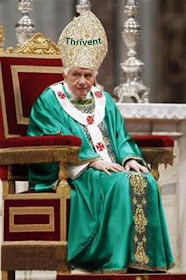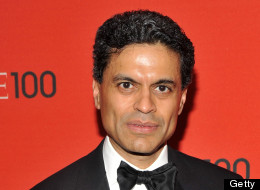 |
| This is Luther's paraphrase of Paul's inspired words. They must be every pastor's own confession of faith. This is from a CPH publication - Paul McCain should read it sometime. |
Paul McCain has left a new comment on your post "Christian News: The current debate in the WELS con...":
Poor old Greg Jackson.
Greg, remember the day you came to the International Center and tried to sell me Northwestern Mutual insurance? What a pathetic site it was.
[GJ - A sermon never written - Paul McCain on the Apostle as a Tent-Maker. Paul, I remember you running up to meet me at a bookstore, writing me a long letter that still resides in my drawer, praising my writing against Church Growth. At the Purple Palace you boasted about your lies about "never working secretly with Otten." You also bragged about undercutting Robert Preus, with Barry's help. I thought, "What an evil, vindictive little man."]
Now you lie about using a copyrighted photo, even your own "investigator" proved that it was taken with the very camera I was using that day.
[GJ - This is getting comical. You got your fancy camera out and photographed a book photo. You did not photograph a painting way up on the wall. If you had done that and watermarked it, I would have observed the warning on Martin Crease-Face. I recall seeing my Photoshop appear on your blog, but your endless plagiarisms are so easy to forget that I am not going to swear on a stack of NNIVs that you would plagiarize me. I am not Roman Catholic. Please explain to the public how you copyrighted a photo owned by someone else when the Wikimedia restriction was clearly stated. Are you so hardened by your UOJ dogma that you cry "Thief!" while stealing shamelessly?
The expert responded already -
He says you used a "copyrighted photo," but there's no proof of that, since McCain did not post a copyright notice by his Chemnitz
photo until recently. A de facto posting of a notice doesn't
mean prior use is a violation.
McCain must not want to release the full Chemnitz photo since, I believe, it is a picture taken out of a gift shop book.
Also, it's odd that he'd take down his pictures from his 2006 post. I wonder is some German publisher contacted him with a Take Down Notice, or maybe even the St. Martini Kirche itself contacted him.]
--
Everyone I know considers you a complete laughing stock.
[GJ - That is the key, Paul. Your few UOJ friends have a common bond. You and Bruce Kintz are raking in $500,000 a year while charging far too much for CPH books Have you no shame?]
You claim to be a "pastor" out of a spare room in hour (sic) rental house.
[GJ - Paul, you claim to be an editor and cannot spell. The congregation called me. Check your Walther since you reject the Word of God and the Book of Concord. I enjoy preaching and teaching about 60 times a year to many people, who have used the service and recordings thousands of times. Rental? Everything is rented. Look around your posh surroundings. All your guns and ammo will belong to someone else some day. So will your house. But - what congregation do you serve, oh collared one?]
You claim to give communion to your disciples, like Brett Meyer over the Internet.
[GJ - The Word consecrates. Members distribute Holy Communion. You have no concept of the efficacy of the Word. But that was already established in your UOJ rants.]
Face it Greg, you never have known what confessional Lutheranism is, or was.
[GJ - Paul, do you mean as defined by the syphilitic founder of your sect? or as defined by his pimp, the Great Kidnapper Walther? I have have studied UOJ at great length and found it completely opposed to the Gospel, as you are.]
You never received any credible Lutheran education.
[GJ - Many of your Ft. Wayne seminary professors got their doctorates from Notre Dame. The former president did too. And Robert Preus went to...Luther Seminary (now ELCA). But you loathed and pitied him, too. I think you loathe and pity people who can earn graduate degrees. Paraphrasing Herman Melville, the Synodical Conference was my Harvard and Yale. I learned the most from all the errors being taught by the Church Growth/UOJ false teachers.]
You wasted your money and your family's time getting degrees from non-Lutheran institutions.
[GJ - I am so ashamed of the $2,000 I borrowed to earn an STM from Yale University. And worse, I am doubled over in grief that I received free tuition and a grant for an MA and PhD from Notre Dame. I actually studied American Lutheran synodical history for my dissertation. Advisors were a famous Roman Catholic historian, which McCain would love. I also had Stanley Hauerwas as an advisor - he is probably the most distinguished modern theologian in America today. And I also had John Howard Yoder, the Mennonite historian, as my main advisor. Nothing promotes study more than trying to explain Lutheran mergers to a Mennonite and a Catholic. That was one of 15 books I have published, and I give 14 of them away.]
Pathetic.
[GJ - Your comments always bring a smile to my face, Paul.
I confess, sometimes I burst into tears - of laughter.]
 |
| Editor McCain - Copying it is fine. Stealing original work and pretending it is your own - that is illegal, unethical, and contrary to the Seventh Commandment. False accusations are slander. |
LPC has left a new comment on your post "Paul McCain Probably Does Not Like the Photoshops,...":
And he said...You wasted your money and your family's time getting degrees from non-Lutheran institutions.
Hahahaha.
Rev.(sic) McCain, you are a sour grape because you did not get a well rounded proper education like Dr. Jackson. You are really astounding.
You consider the following a good thing:
a.) engaging in fallacy
b.) intellectual-in-breeding
In your world what is good is considered evil and you hold what is considered by decent people as evil, good.
Your smugness reminds me of Pentecostal pastors I know when I was a Pentecostal.
They think to themselves they are not heretics because they are card carrying member of their denomination, another form of Romanism.
Yet, I do not think you are convinced of your Lutheranism either since you often laud Roman Catholic dignitaries and use RC sources in your blog.
LPC


















